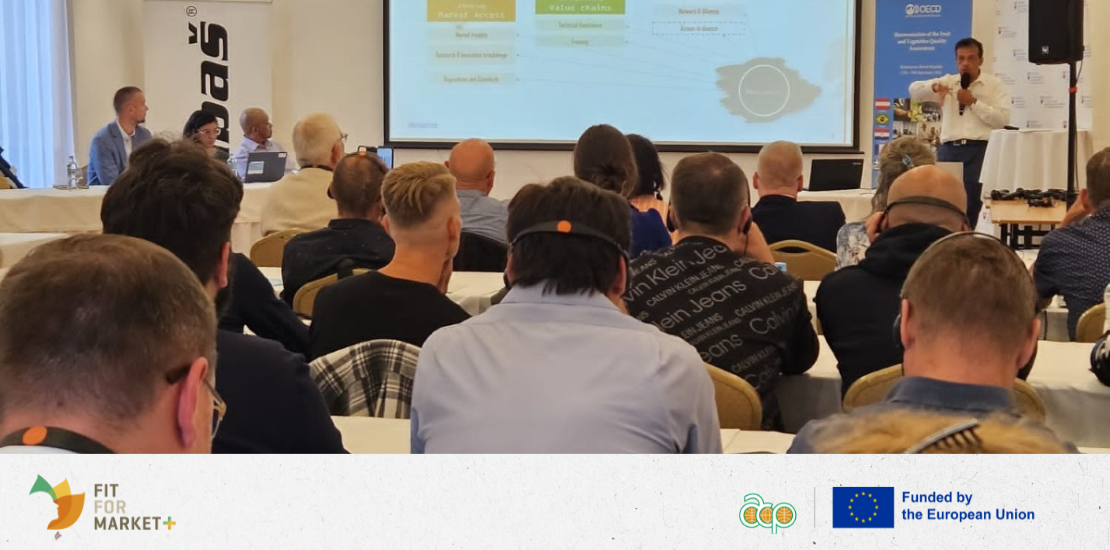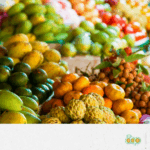- 29/10/2024
- Posted by: Sandra Borma
- Category: News

OECD-COLEAD cooperation on marketing standards for fresh fruit and vegetables
COLEAD continues to strengthen its collaboration with international partners, as demonstrated by its active participation in the recent OECD training session held in Mojmirovce, Slovakia from 17-19 September 2024. This event, organised under the OECD Scheme for the Application of Marketing Standards for Fresh Fruit and Vegetables, focuses on harmonising quality control practices in the sector, a critical aspect of ensuring fair and transparent trade in global markets.
The OECD Scheme plays a key role in promoting the standardisation of quality criteria for fresh produce, facilitating smoother international trade and improving the understanding of evolving market standards among industry professionals. The annual training sessions, such as this one in Slovakia, serve as a platform for key stakeholders – including public and private sector inspectors from various Eastern European and international countries – to share knowledge, align practices and keep abreast of the latest regulatory changes.
This year, experts from several OECD member countries, including Austria, Brazil, Slovakia and Spain, presented the latest regulatory developments for key crops such as citrus, plums, courgettes and walnuts. The focus was on standards set by the United Nations Economic Commission for Europe (UNECE) and related explanatory materials prepared by both the OECD and UNECE. These meetings are essential to promote a common understanding of international quality standards and to ensure consistent application across borders, which is increasingly important in a globalised market where barriers to trade need to be minimised.
COLEAD’s presence at this event underlines its growing contribution on global agricultural standards and supporting sustainable agri-food systems, particularly for ACP countries. For the fifth time, COLEAD was been invited to present insights on the role of African, Caribbean and Pacific (ACP) countries in the global fresh produce trade, highlighting their position as key suppliers to European Union markets. Within the context of FFM+, COLEAD’s Market Information Department presented its latest sector analysis on fresh citrus, providing a comprehensive overview of the technical and commercial challenges and opportunities for investors. This study is part of a wider citrus sector analysis package, covering both fresh and processed citrus products, as well as co-products such as citrus oil and peel, to be published by early 2025.
In addition to the market analysis, COLEAD’s training department contributed by providing an online demonstration of a new digital training tool commissioned by the OECD. This tool, developed on the basis of the OECD Guidelines for Conformity Assessment of Fresh Fruit and Vegetables, is expected to be fully operational by the end of 2024. COLEAD previously demonstrated the tool during its development phase in the Netherlands earlier this year. This digital innovation aims to modernise training methods and enhance the capacity of professionals involved in the application of these standards.
COLEAD’s involvement in these international platforms reflects its broader mission to support sustainable agricultural practices and improve market transparency. Working with the OECD and UNECE not only contributes to the harmonisation of marketing standards, but also ensures that producers, particularly from ACP countries, are well equipped to navigate the complexities of international trade and market requirements. This engagement is a critical component of COLEAD’s ongoing efforts among other under FFM+ to strengthen global food systems and create more equitable opportunities for all stakeholders along the value chain.
This activity is supported by the Fit For Market Plus (FFM+) programme, implemented by COLEAD within the Framework of Development Cooperation between the Organisation of African, Caribbean and Pacific States (OACPS) and the European Union. This publication receives financial support from the European Union and the OACPS. The content of this publication is the sole responsibility of COLEAD and can in no way be taken to reflect the views of the European Union or the OACPS.





